ICTICT418: Professional Ethics, Copyright & Privacy Discussion
VerifiedAdded on 2023/04/19
|5
|1327
|130
Homework Assignment
AI Summary
This assignment solution discusses the importance of maintaining professional and ethical conduct, handling personal data with confidentiality, and reviewing organizational policies and procedures in an ICT environment. It highlights the Australian Computer Society's (ACS) codes of ethics and their role in promoting professionalism within the ICT industry. The discussion covers compliance with Australian privacy laws, including state and territory regulations related to online activities and data collection. Furthermore, it addresses strategies for examining organizational systems to ensure they meet legislative and organizational requirements, such as involving leaders in policy creation and implementation, gathering employee feedback, and utilizing technology to monitor policy effectiveness. The document references scholarly articles to support the points discussed.
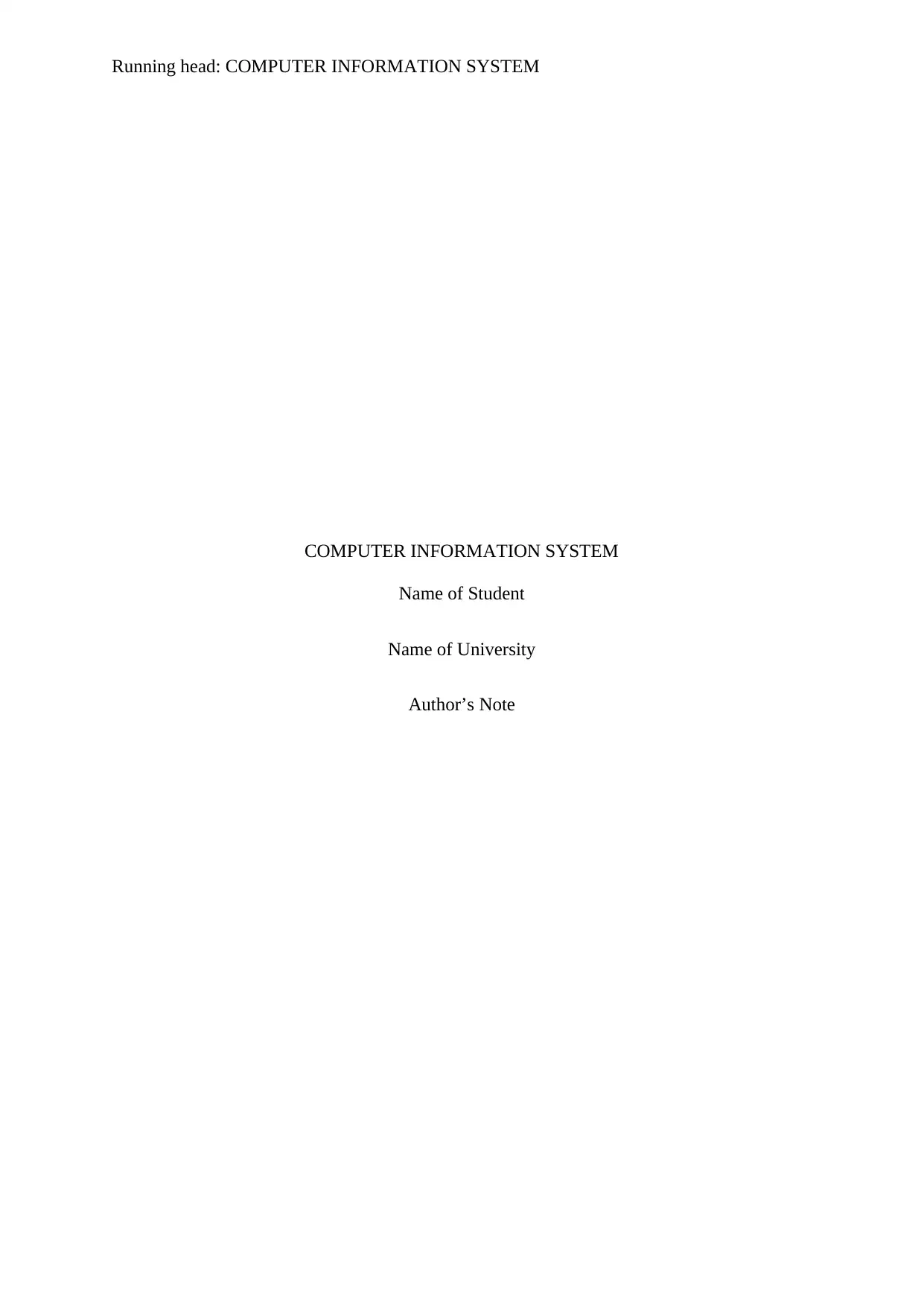
Running head: COMPUTER INFORMATION SYSTEM
COMPUTER INFORMATION SYSTEM
Name of Student
Name of University
Author’s Note
COMPUTER INFORMATION SYSTEM
Name of Student
Name of University
Author’s Note
Paraphrase This Document
Need a fresh take? Get an instant paraphrase of this document with our AI Paraphraser
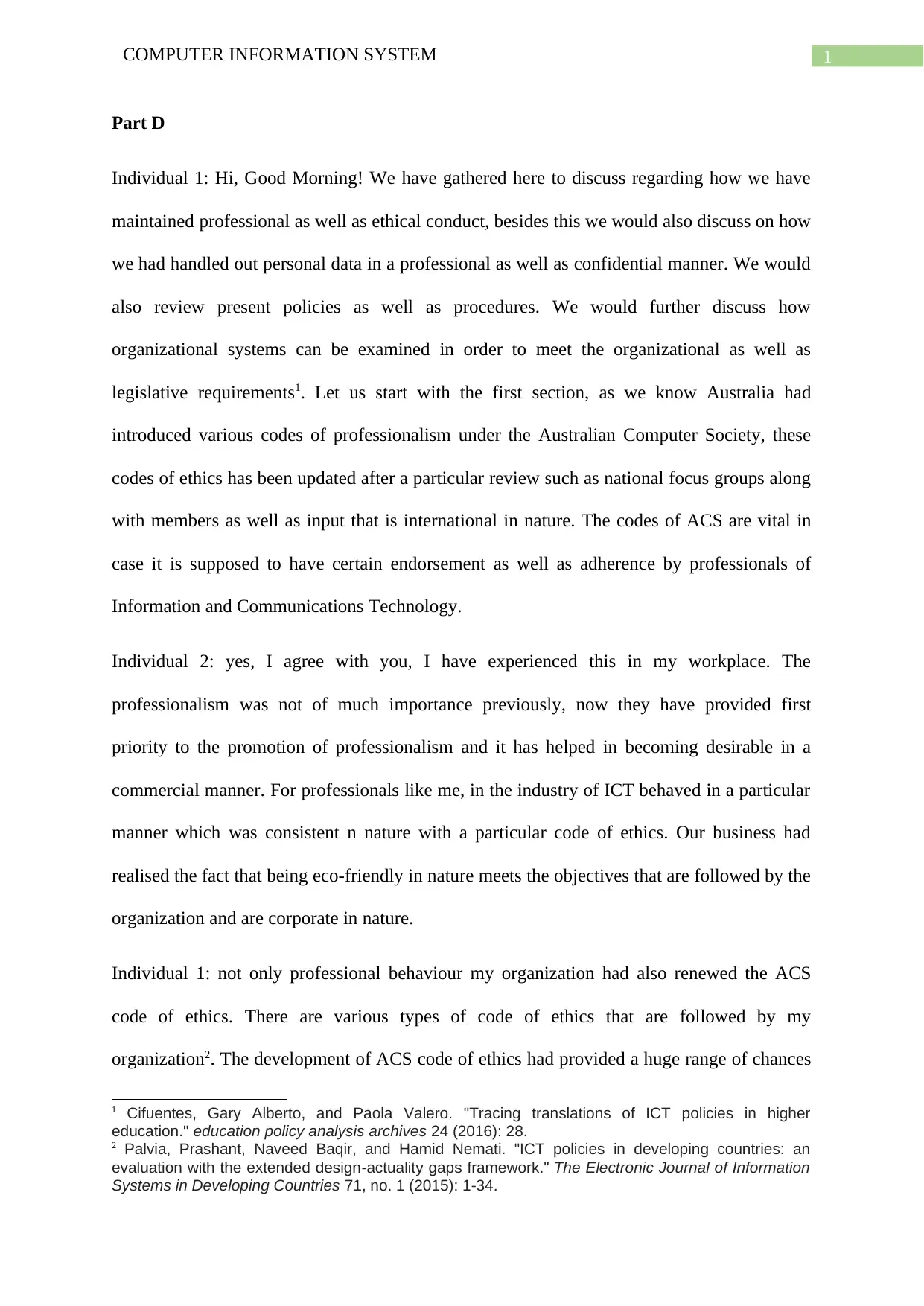
1COMPUTER INFORMATION SYSTEM
Part D
Individual 1: Hi, Good Morning! We have gathered here to discuss regarding how we have
maintained professional as well as ethical conduct, besides this we would also discuss on how
we had handled out personal data in a professional as well as confidential manner. We would
also review present policies as well as procedures. We would further discuss how
organizational systems can be examined in order to meet the organizational as well as
legislative requirements1. Let us start with the first section, as we know Australia had
introduced various codes of professionalism under the Australian Computer Society, these
codes of ethics has been updated after a particular review such as national focus groups along
with members as well as input that is international in nature. The codes of ACS are vital in
case it is supposed to have certain endorsement as well as adherence by professionals of
Information and Communications Technology.
Individual 2: yes, I agree with you, I have experienced this in my workplace. The
professionalism was not of much importance previously, now they have provided first
priority to the promotion of professionalism and it has helped in becoming desirable in a
commercial manner. For professionals like me, in the industry of ICT behaved in a particular
manner which was consistent n nature with a particular code of ethics. Our business had
realised the fact that being eco-friendly in nature meets the objectives that are followed by the
organization and are corporate in nature.
Individual 1: not only professional behaviour my organization had also renewed the ACS
code of ethics. There are various types of code of ethics that are followed by my
organization2. The development of ACS code of ethics had provided a huge range of chances
1 Cifuentes, Gary Alberto, and Paola Valero. "Tracing translations of ICT policies in higher
education." education policy analysis archives 24 (2016): 28.
2 Palvia, Prashant, Naveed Baqir, and Hamid Nemati. "ICT policies in developing countries: an
evaluation with the extended design‐actuality gaps framework." The Electronic Journal of Information
Systems in Developing Countries 71, no. 1 (2015): 1-34.
Part D
Individual 1: Hi, Good Morning! We have gathered here to discuss regarding how we have
maintained professional as well as ethical conduct, besides this we would also discuss on how
we had handled out personal data in a professional as well as confidential manner. We would
also review present policies as well as procedures. We would further discuss how
organizational systems can be examined in order to meet the organizational as well as
legislative requirements1. Let us start with the first section, as we know Australia had
introduced various codes of professionalism under the Australian Computer Society, these
codes of ethics has been updated after a particular review such as national focus groups along
with members as well as input that is international in nature. The codes of ACS are vital in
case it is supposed to have certain endorsement as well as adherence by professionals of
Information and Communications Technology.
Individual 2: yes, I agree with you, I have experienced this in my workplace. The
professionalism was not of much importance previously, now they have provided first
priority to the promotion of professionalism and it has helped in becoming desirable in a
commercial manner. For professionals like me, in the industry of ICT behaved in a particular
manner which was consistent n nature with a particular code of ethics. Our business had
realised the fact that being eco-friendly in nature meets the objectives that are followed by the
organization and are corporate in nature.
Individual 1: not only professional behaviour my organization had also renewed the ACS
code of ethics. There are various types of code of ethics that are followed by my
organization2. The development of ACS code of ethics had provided a huge range of chances
1 Cifuentes, Gary Alberto, and Paola Valero. "Tracing translations of ICT policies in higher
education." education policy analysis archives 24 (2016): 28.
2 Palvia, Prashant, Naveed Baqir, and Hamid Nemati. "ICT policies in developing countries: an
evaluation with the extended design‐actuality gaps framework." The Electronic Journal of Information
Systems in Developing Countries 71, no. 1 (2015): 1-34.
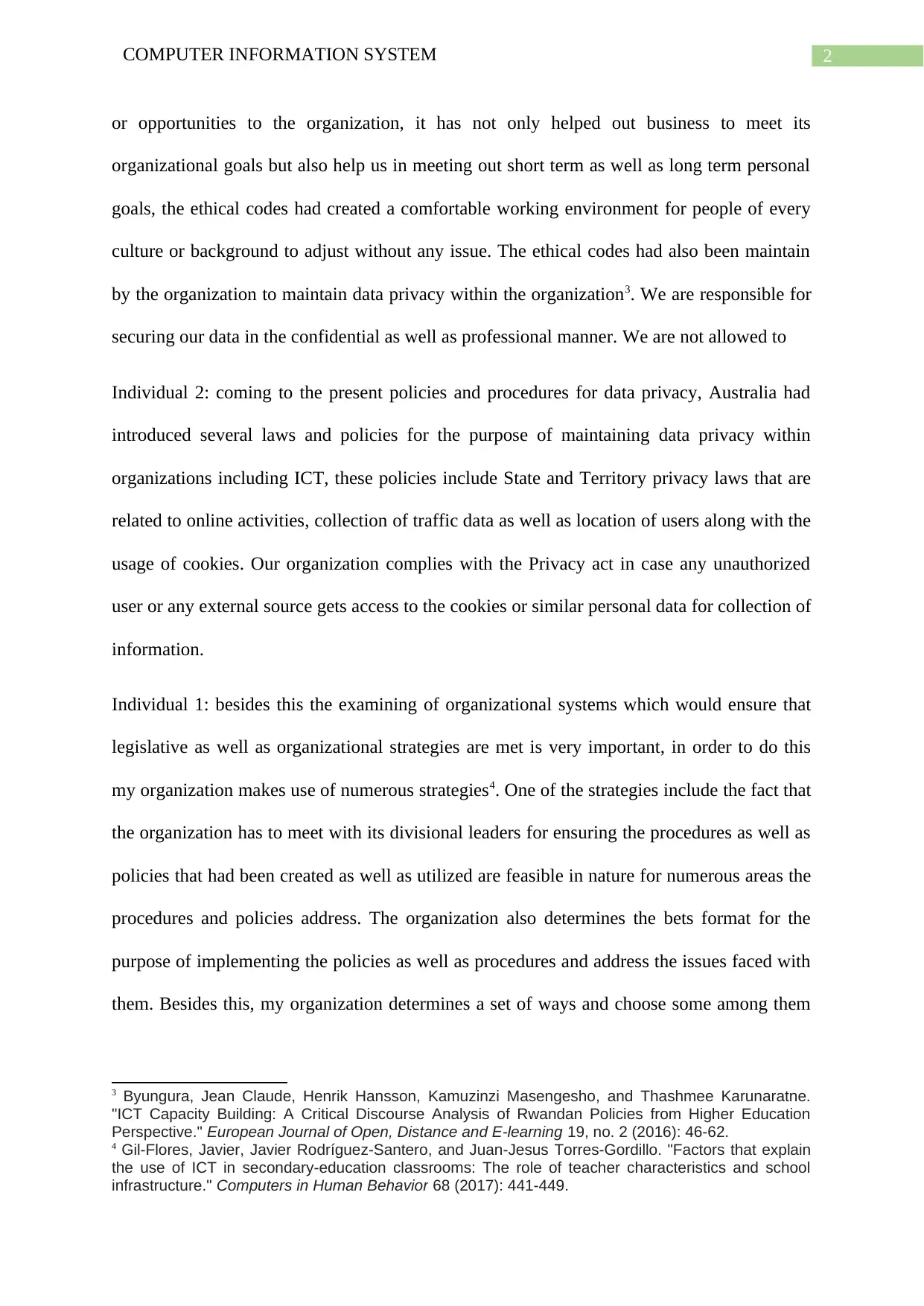
2COMPUTER INFORMATION SYSTEM
or opportunities to the organization, it has not only helped out business to meet its
organizational goals but also help us in meeting out short term as well as long term personal
goals, the ethical codes had created a comfortable working environment for people of every
culture or background to adjust without any issue. The ethical codes had also been maintain
by the organization to maintain data privacy within the organization3. We are responsible for
securing our data in the confidential as well as professional manner. We are not allowed to
Individual 2: coming to the present policies and procedures for data privacy, Australia had
introduced several laws and policies for the purpose of maintaining data privacy within
organizations including ICT, these policies include State and Territory privacy laws that are
related to online activities, collection of traffic data as well as location of users along with the
usage of cookies. Our organization complies with the Privacy act in case any unauthorized
user or any external source gets access to the cookies or similar personal data for collection of
information.
Individual 1: besides this the examining of organizational systems which would ensure that
legislative as well as organizational strategies are met is very important, in order to do this
my organization makes use of numerous strategies4. One of the strategies include the fact that
the organization has to meet with its divisional leaders for ensuring the procedures as well as
policies that had been created as well as utilized are feasible in nature for numerous areas the
procedures and policies address. The organization also determines the bets format for the
purpose of implementing the policies as well as procedures and address the issues faced with
them. Besides this, my organization determines a set of ways and choose some among them
3 Byungura, Jean Claude, Henrik Hansson, Kamuzinzi Masengesho, and Thashmee Karunaratne.
"ICT Capacity Building: A Critical Discourse Analysis of Rwandan Policies from Higher Education
Perspective." European Journal of Open, Distance and E-learning 19, no. 2 (2016): 46-62.
4 Gil-Flores, Javier, Javier Rodríguez-Santero, and Juan-Jesus Torres-Gordillo. "Factors that explain
the use of ICT in secondary-education classrooms: The role of teacher characteristics and school
infrastructure." Computers in Human Behavior 68 (2017): 441-449.
or opportunities to the organization, it has not only helped out business to meet its
organizational goals but also help us in meeting out short term as well as long term personal
goals, the ethical codes had created a comfortable working environment for people of every
culture or background to adjust without any issue. The ethical codes had also been maintain
by the organization to maintain data privacy within the organization3. We are responsible for
securing our data in the confidential as well as professional manner. We are not allowed to
Individual 2: coming to the present policies and procedures for data privacy, Australia had
introduced several laws and policies for the purpose of maintaining data privacy within
organizations including ICT, these policies include State and Territory privacy laws that are
related to online activities, collection of traffic data as well as location of users along with the
usage of cookies. Our organization complies with the Privacy act in case any unauthorized
user or any external source gets access to the cookies or similar personal data for collection of
information.
Individual 1: besides this the examining of organizational systems which would ensure that
legislative as well as organizational strategies are met is very important, in order to do this
my organization makes use of numerous strategies4. One of the strategies include the fact that
the organization has to meet with its divisional leaders for ensuring the procedures as well as
policies that had been created as well as utilized are feasible in nature for numerous areas the
procedures and policies address. The organization also determines the bets format for the
purpose of implementing the policies as well as procedures and address the issues faced with
them. Besides this, my organization determines a set of ways and choose some among them
3 Byungura, Jean Claude, Henrik Hansson, Kamuzinzi Masengesho, and Thashmee Karunaratne.
"ICT Capacity Building: A Critical Discourse Analysis of Rwandan Policies from Higher Education
Perspective." European Journal of Open, Distance and E-learning 19, no. 2 (2016): 46-62.
4 Gil-Flores, Javier, Javier Rodríguez-Santero, and Juan-Jesus Torres-Gordillo. "Factors that explain
the use of ICT in secondary-education classrooms: The role of teacher characteristics and school
infrastructure." Computers in Human Behavior 68 (2017): 441-449.
⊘ This is a preview!⊘
Do you want full access?
Subscribe today to unlock all pages.

Trusted by 1+ million students worldwide
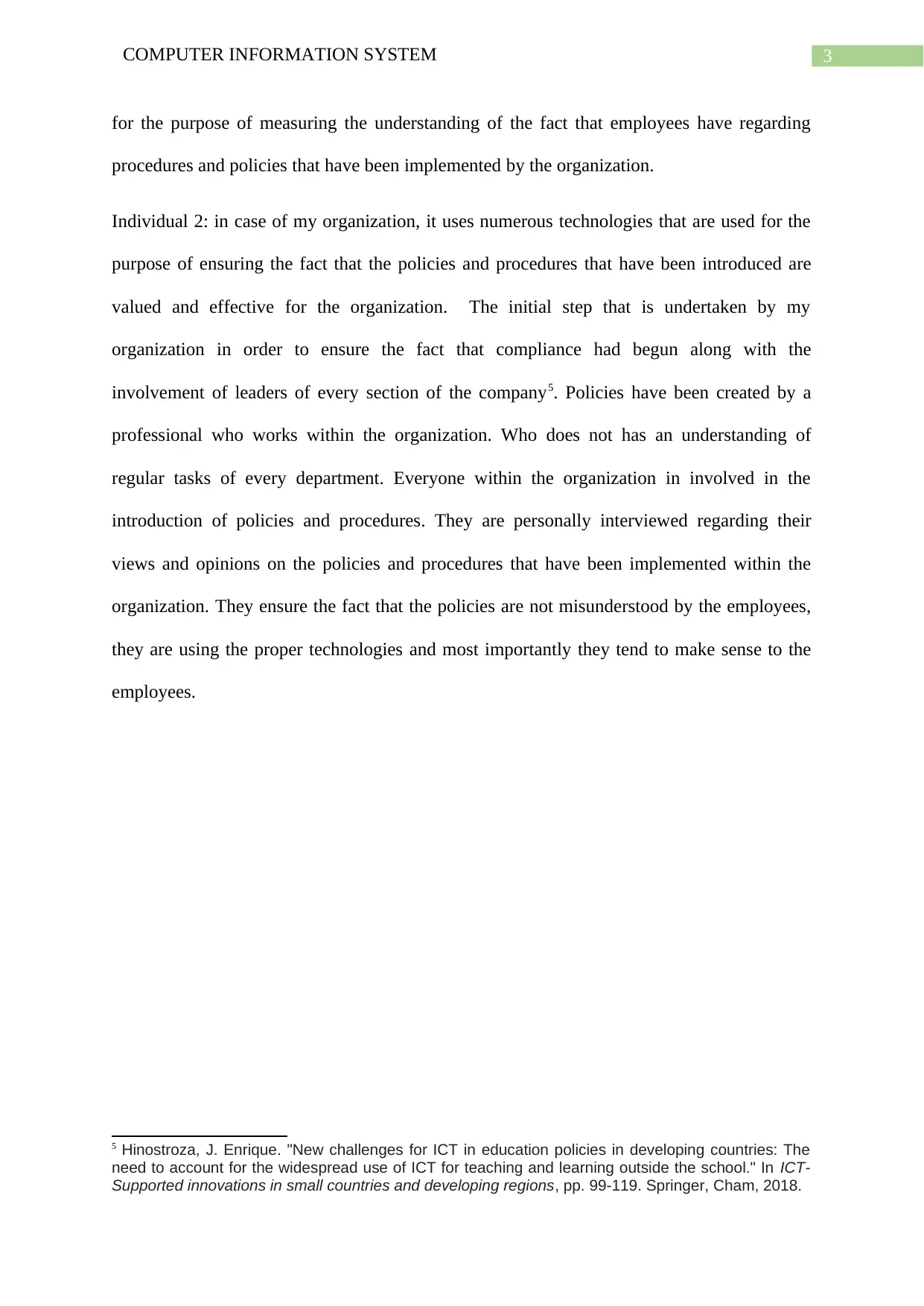
3COMPUTER INFORMATION SYSTEM
for the purpose of measuring the understanding of the fact that employees have regarding
procedures and policies that have been implemented by the organization.
Individual 2: in case of my organization, it uses numerous technologies that are used for the
purpose of ensuring the fact that the policies and procedures that have been introduced are
valued and effective for the organization. The initial step that is undertaken by my
organization in order to ensure the fact that compliance had begun along with the
involvement of leaders of every section of the company5. Policies have been created by a
professional who works within the organization. Who does not has an understanding of
regular tasks of every department. Everyone within the organization in involved in the
introduction of policies and procedures. They are personally interviewed regarding their
views and opinions on the policies and procedures that have been implemented within the
organization. They ensure the fact that the policies are not misunderstood by the employees,
they are using the proper technologies and most importantly they tend to make sense to the
employees.
5 Hinostroza, J. Enrique. "New challenges for ICT in education policies in developing countries: The
need to account for the widespread use of ICT for teaching and learning outside the school." In ICT-
Supported innovations in small countries and developing regions, pp. 99-119. Springer, Cham, 2018.
for the purpose of measuring the understanding of the fact that employees have regarding
procedures and policies that have been implemented by the organization.
Individual 2: in case of my organization, it uses numerous technologies that are used for the
purpose of ensuring the fact that the policies and procedures that have been introduced are
valued and effective for the organization. The initial step that is undertaken by my
organization in order to ensure the fact that compliance had begun along with the
involvement of leaders of every section of the company5. Policies have been created by a
professional who works within the organization. Who does not has an understanding of
regular tasks of every department. Everyone within the organization in involved in the
introduction of policies and procedures. They are personally interviewed regarding their
views and opinions on the policies and procedures that have been implemented within the
organization. They ensure the fact that the policies are not misunderstood by the employees,
they are using the proper technologies and most importantly they tend to make sense to the
employees.
5 Hinostroza, J. Enrique. "New challenges for ICT in education policies in developing countries: The
need to account for the widespread use of ICT for teaching and learning outside the school." In ICT-
Supported innovations in small countries and developing regions, pp. 99-119. Springer, Cham, 2018.
Paraphrase This Document
Need a fresh take? Get an instant paraphrase of this document with our AI Paraphraser
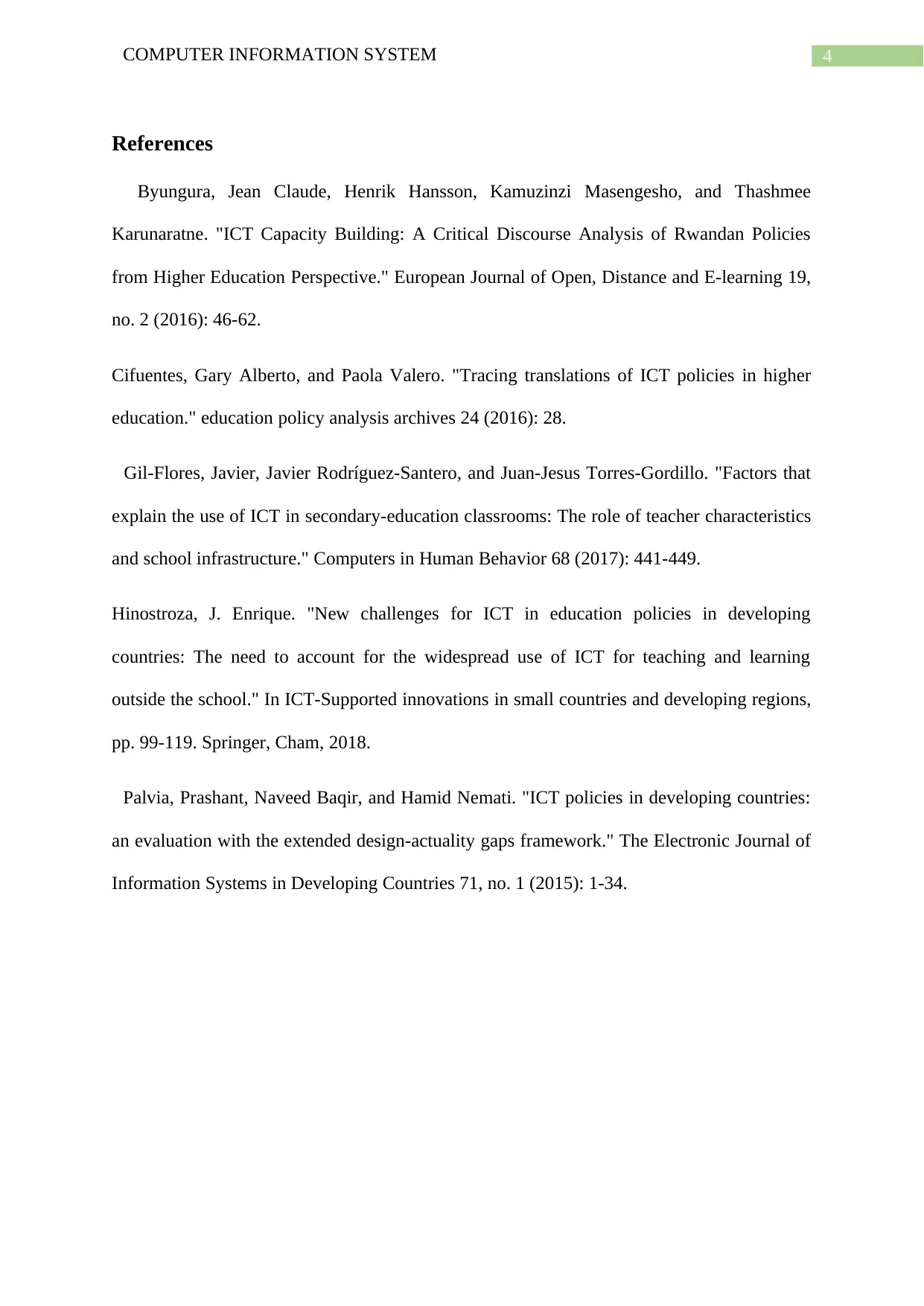
4COMPUTER INFORMATION SYSTEM
References
Byungura, Jean Claude, Henrik Hansson, Kamuzinzi Masengesho, and Thashmee
Karunaratne. "ICT Capacity Building: A Critical Discourse Analysis of Rwandan Policies
from Higher Education Perspective." European Journal of Open, Distance and E-learning 19,
no. 2 (2016): 46-62.
Cifuentes, Gary Alberto, and Paola Valero. "Tracing translations of ICT policies in higher
education." education policy analysis archives 24 (2016): 28.
Gil-Flores, Javier, Javier Rodríguez-Santero, and Juan-Jesus Torres-Gordillo. "Factors that
explain the use of ICT in secondary-education classrooms: The role of teacher characteristics
and school infrastructure." Computers in Human Behavior 68 (2017): 441-449.
Hinostroza, J. Enrique. "New challenges for ICT in education policies in developing
countries: The need to account for the widespread use of ICT for teaching and learning
outside the school." In ICT-Supported innovations in small countries and developing regions,
pp. 99-119. Springer, Cham, 2018.
Palvia, Prashant, Naveed Baqir, and Hamid Nemati. "ICT policies in developing countries:
an evaluation with the extended design‐actuality gaps framework." The Electronic Journal of
Information Systems in Developing Countries 71, no. 1 (2015): 1-34.
References
Byungura, Jean Claude, Henrik Hansson, Kamuzinzi Masengesho, and Thashmee
Karunaratne. "ICT Capacity Building: A Critical Discourse Analysis of Rwandan Policies
from Higher Education Perspective." European Journal of Open, Distance and E-learning 19,
no. 2 (2016): 46-62.
Cifuentes, Gary Alberto, and Paola Valero. "Tracing translations of ICT policies in higher
education." education policy analysis archives 24 (2016): 28.
Gil-Flores, Javier, Javier Rodríguez-Santero, and Juan-Jesus Torres-Gordillo. "Factors that
explain the use of ICT in secondary-education classrooms: The role of teacher characteristics
and school infrastructure." Computers in Human Behavior 68 (2017): 441-449.
Hinostroza, J. Enrique. "New challenges for ICT in education policies in developing
countries: The need to account for the widespread use of ICT for teaching and learning
outside the school." In ICT-Supported innovations in small countries and developing regions,
pp. 99-119. Springer, Cham, 2018.
Palvia, Prashant, Naveed Baqir, and Hamid Nemati. "ICT policies in developing countries:
an evaluation with the extended design‐actuality gaps framework." The Electronic Journal of
Information Systems in Developing Countries 71, no. 1 (2015): 1-34.
1 out of 5
Related Documents
Your All-in-One AI-Powered Toolkit for Academic Success.
+13062052269
info@desklib.com
Available 24*7 on WhatsApp / Email
![[object Object]](/_next/static/media/star-bottom.7253800d.svg)
Unlock your academic potential
Copyright © 2020–2026 A2Z Services. All Rights Reserved. Developed and managed by ZUCOL.




